Table of Contents
Introduction
[00:00:00] Detective Ev: Well, hello, my friends. Welcome back to another episode of the Health Detective Podcast by Functional Diagnostic Nutrition. My name is Evan Transue, AKA Detective Ev. I will be your host for today’s show where we hear how a history of autoimmunity can be turned around.

We’re talking to my colleague, Jenn Cino who’s a fellow FDN practitioner. You’re going to hear not only how she used FDN’s system and principles to radically change her own health, but also how she used it to start a thriving business completely online.
Jenn is killing it right now and this is someone that wasn’t really killing it three years ago. She had started a gym with her partner in July of 2019. She lives in Canada, so you’ll understand the relevance of this in just a second. They took it over for a year and start the gym. Anything happen relatively soon after that? Yeah, like COVID and stuff.
If you’re in the USA listening to this, you know how bad our restrictions were. Canada, some of the worst out there in terms of the lack of flexibility that you had with businesses and just being able to work, it’s not a pretty place to be when it comes to COVID 19 and owning a business. So, this really messed them up.
They basically said, all right, screw it, we’re just going to not do the gym anymore. They didn’t resign the lease or anything like that, but now they’re left with no income. Jenn immediately got to work, and she eventually found the FDN program. She started doing some stuff online before that and was having some success.
More About Jenn Cino
She went through the FDN program and just graduated in March of this year, 2022. This has helped absolutely blow up her business. She described getting access to the lab testing and the training for it as a total game changer for her. So, I think you guys will really love this story. But again, it’s not just about the business side.
There’s also a lot of stuff, health wise, here. Her mom had multiple sclerosis. Her dad had scleroderma and I actually believe they probably do have these things. Just because we’re FDNs doesn’t mean our parents are necessarily going to change every little thing to be clear.
She has been diagnosed with Hashimoto’s and I think she’s about to get lab results back that are going to prove she has gotten this really under control or to a much better place. That’ll all make more sense once we get to the interview itself. I’ll give you a little bit about her professionally and then we’ll jump into it.
She is a certified Functional Diagnostic Nutrition practitioner, as I mentioned, also, a certified personal trainer. She’s the creator of Fit + Functional, a program dedicated to helping women find the underlying root cause of their health issues. She has been featured in publications, such as Byrdie and Sunday Riley, and has written for Forbes on the benefits of cycle-syncing your business.

Through her own journey of health and healing, Jenn has been able to work one-on-one with over 300 women worldwide since 2020. That is impressive. That might just be a record on this show. I don’t know the exact numbers for everyone, but if I had to guess, I’m going to call that a record.
Unlimited Potential of Social Media
I think you guys are really going to like this one. It’s a perfect mix of inspiration for business and inspiration for health. Without further ado, let’s get to the episode.
All right. Hey there, Jenn. Thanks so much for being here with us today.
[00:03:03] Jenn Cino: Thank you. Thanks for having me. I’m excited to be here.

[00:03:06] Detective Ev: Yeah. I’ve heard some very impressive and good things about what you’re doing and how you’re making this work for you, especially using social media and all this stuff.
I think it’s kind of crazy because there’s so many people out there having great success with it. Yet, I don’t even think 10% of this has been tapped into yet with the potential for so many other people out there to utilize social media for their businesses or their brands, whatever it might be.
I mean, FDN or not, you could be selling cars, you could be selling a completely new product that’s innovative to whatever market. I still think social media is the best thing ever that’s not fully tapped into yet. I’m sure we’ll talk about some of that stuff later.
When we start off on this podcast, I typically like to use the same question to get it rolling. The question I want to start with today is, when did your health symptoms start and what did they look like? I’m going to assume you’re not in this space by accident. It probably was either you or someone else close to you that was dealing with some health symptoms that led you to where you’re at today. Is that correct?
History of Autoimmunity: Going on Birth Control
[00:03:57] Jenn Cino: Yeah, that’s right. I mean, it’s a little bit of both actually. Just in terms of my family when I was quite young, I think I was about 10 years old, my mom was diagnosed with MS. Then my dad, shortly after, a couple years after I was about 13, 14 was diagnosed with scleroderma, which is an autoimmune disease. Essentially his body produces too much collagen. It causes Raynaud’s and rheumatoid arthritis and all that fun stuff.
So, from a very young age, I don’t know if I was wise beyond my years, but I was taking notice to those things and notice to how it impacted my childhood and their health, obviously, but also financially, basically, having to go on disability when they were only in their late thirties, early forties. From a very young age, I was very hyper aware of health and more so of poor health and how that affects your whole life and whole dynamic.

Then when I was 14, so I was in first year of high school, I was dealing with a lot of period issues, really heavy periods, really painful periods. I begged my mom, eventually, she gave in, and I went on birth control. Was never told any of the side effects or how to kind of take care of my body or what I could expect, which is obviously very, very common.
You know, we’re not taught anything about our bodies, whether it’s male or female. I stayed on birth control for seven years. I quit cold turkey when I was 21. I started losing my hair, started breaking out everywhere, had severe, severe digestive issues.
History of Autoimmunity: Receiving Many Diagnoses
Looking back, I never had really any diagnosis, other than IBS, which is in my opinion, I don’t know what’s wrong with you. You just have a sore stomach kind of diagnosis.

But looking back, I probably had SIBO. I was probably early stage, even, IBD at that point, just kind of putting things together. I had high grade cervical dysplasia. I had ovarian cysts. I had all these things happening to me when I was in my early twenties. I just remember I saw my parents go through the health struggles and I was so determined to not have that story for me. I just remember thinking, if 22 feels like this, what is 32 going to feel like? What’s 42 going to feel like? That really honestly scared me.
I really started diving in more to the alternative route because I saw how Western medicine didn’t really help my parents get any better. So, I started doing my own research, kind of used myself as a guinea pig for many, many years, was eventually diagnosed with Hashimoto’s and hypothyroidism. So, the whole lot was kind of thrown at me, again, throughout my twenties.
I ended up, kind of how I got into this professionally, but I started getting more into fitness and all that kind of stuff. I became a personal trainer when I was 24. Got my nutrition certification. I do have a Bachelor of Science too, so I was kind of always a nerd in that way, a research nerd.
Family History of Autoimmunity
Throughout the years of being a personal trainer, one thing led to another. It was less about the “calories in, calories out.” I knew that that was only the surface of health and weight loss and ended up just getting a couple more certifications. It just naturally progressed.
Then obviously went through FDN and here I am today, many years later.
[00:07:02] Detective Ev: Not that I want to hone in on this one point, but I like that you already mentioned the “calories in, calories out” thing because it’s, still to this day, oversimplified by these fitness gurus on Instagram and stuff like that.
At the extremes, they are absolutely correct. In fact, the more extreme you go, the more correct you are. If someone eats zero calories a day, yes, you are guaranteed weight loss. And if someone eats 10,000 calories a day, unless they’re Michael Phelps doing his swimming thing, then yes, most likely you’re going to gain weight.
But the more normal you get with the calorie amount, like let’s take 3000 calories. Right? I don’t know if it’s so simple as “calories in, calories out.” It’s like, okay, well, what is this person eating in terms of the quality of the food? What macronutrients are involved in that? No, there is absolutely a difference, I’ve seen it in myself. Anyway, I don’t want to get actually into that, but I have to bring it up any time it’s brought up on this. I just appreciate us shining some light on some crazy narratives that are still spatted to this day.
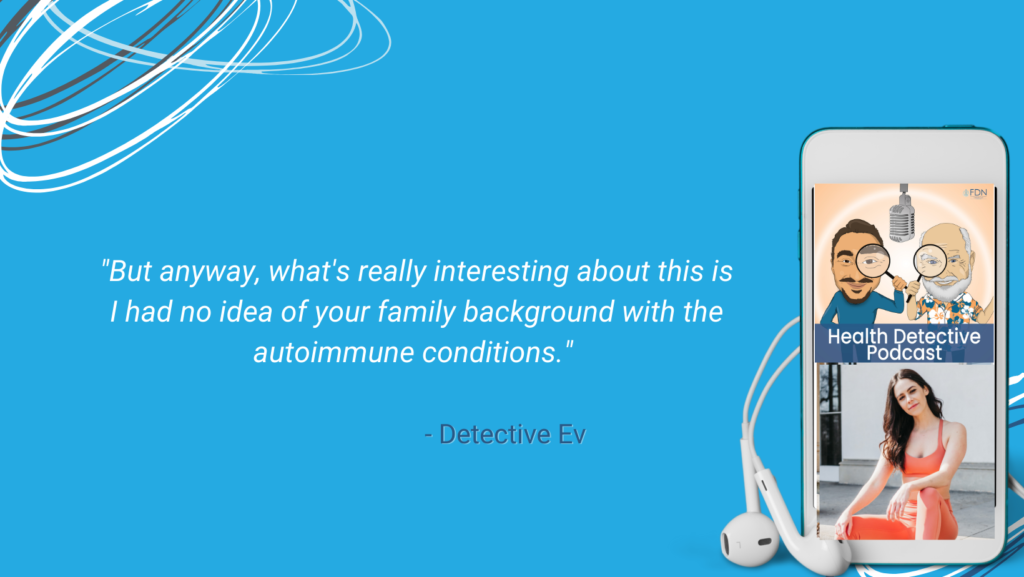
But anyway, what’s really interesting about this is I had no idea of your family background with the autoimmune conditions.
History of Autoimmunity: Symptoms Before the Diagnosis
In many ways, Jenn, one of the main reasons that I’m an FDN myself and in this world is because of autoimmunity and just the other things that come with it.

Dr. Tom O’Brien talks about in his book, The Autoimmune Fix, the autoimmune spectrum. There’s all these little symptoms that people like us typically deal with before ever meeting that diagnosis. We might meet it along with the diagnosis, the skin issues, the headaches, the gut problems, and the fatigue. You could see these issues kind of manifesting long before they happen. It’s in men as well.
That’s particularly interesting that your mom had MS while dad’s dealing with scleroderma. The only time I had heard about that is when they suspected my mom had scleroderma. She had Grave’s disease.
Then again, even you couldn’t escape it for a little bit there, ended up getting the Hashimoto’s thing. I’m glad you caught it when you did, because I think that’s really an astute observation to say in your early twenties, if this is how I feel now, logic would tell me this isn’t going to get better as I get older. It’s probably going to get worse.
I know that you’re thinking long term, I might feel worse and worse, but did you think this was just normal or genetic at any point? I mean, you’re seeing it in your parents, now you’re having symptoms yourself. Like what is your perspective as a young person, as to rationalizing why you have these symptoms?
[00:09:07] Jenn Cino: So that’s such a good question. I was actually talking to a friend about this literally yesterday.
History of Autoimmunity: Expecting It & Assuming Control
I do remember, just in terms of my thyroid issues alone, my whole family pretty much has hypothyroidism, my dad has Hashimoto’s. Like, it was very expected, I suppose.
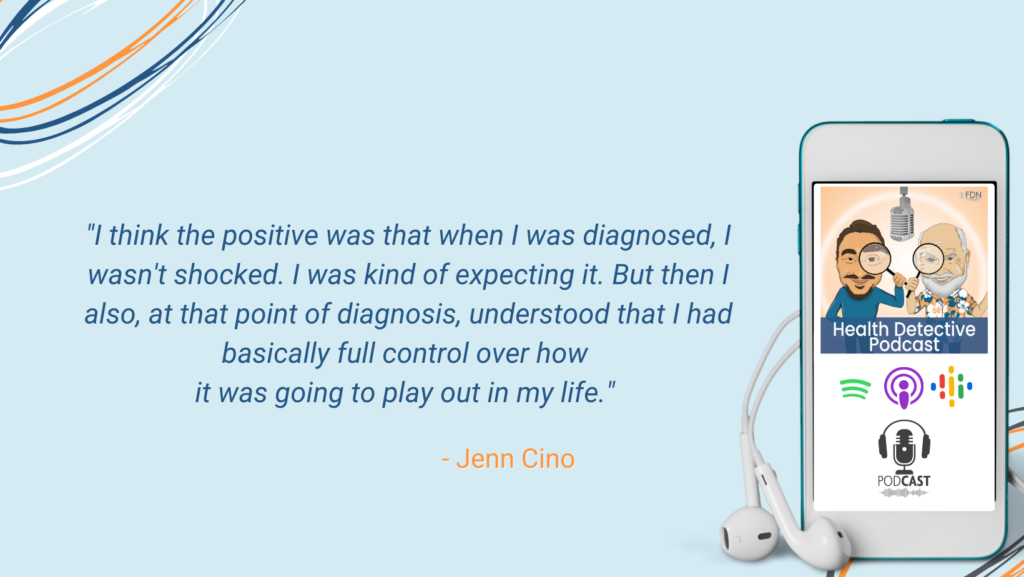
I feel like when I started, again, becoming more aware, I remember having those thoughts, like, oh God, when is like the boogie monster going to catch me type thing. It was just expected. I think there was negatives and positives to that. I think the positive was that when I was diagnosed, I wasn’t shocked. I was kind of expecting it. But then I also, at that point of diagnosis, understood that I had basically full control over how it was going to play out in my life.
People to this day are still shocked when I say, yeah, I’ve Hashimoto’s, I have hypothyroidism. Well, you don’t look like it. It’s because I obviously am able to take the knowledge I have and the education and the experience and put that into practice. I’m actually getting my thyroid tested in two weeks. I’m interested to see how that has played out over the last year or so.
But yeah, there was definitely a big component to my mindset, I guess, for a very long time that I placed all the emphasis on genetics. Like, you know, both my parents are sick, I have an unhealthy family. It was bound to happen to me type thing.
Obviously, again, as I became more aware over the last really decade or more, I understood that, yes, maybe I was predisposed genetically a little bit to thyroid issues and that’s how my family presents symptoms. But I also understand that root cause. Of course FDN talks about root cause all the time, metabolic chaos, and stress.
History of Autoimmunity: Mindset Change
I believe that stress is the ultimate root cause, whether that’s emotional, mental, physical, biochemical, it presents differently, I feel like, based on genetics. Again, my family is a little bit more, I guess, genetically predisposed to those autoimmune, those thyroid issues. Whereas someone else might be endometriosis or certain types of cancer, or etc.

So, yeah. Great question. It did start very mindset, genetic, this is how it’s going to be. Then as I Guinea pigged on myself, I understood more that, I actually have a lot more power over how I feel than what I always thought. My mom’s a nurse too. So, I grew up with a very kind of Western medicine, I guess, perspective to everything.
[00:11:29] Detective Ev: Well, I’m glad you liked the question, it’s something I ask often. I’m fascinated by what is going through people’s heads because sometimes it’s really tough. For our audience that’s listening, these people might really be in the midst of this, and they don’t have a ton of hope.
Like they’re listening because they’re interested in, maybe they’re just starting to gain some hope, but they’re not on the level we are yet. They’re not going through these certifications and having all this knowledge where we’ve been able to see in ourselves, real results that are amazing.
So, I think it’s important to relate to them and let them know we were scared at one point too. We were kind of nervous, we were thinking that this is genetics. I still have people call me to this day and it’s kind of hilarious because they will call me about a condition that they believe that maybe the type of work we do can help with.
History of Autoimmunity: Genes Load the Gun
I’m asking them, like, do you have any other symptoms or diagnoses, whatever? They’ll go through some stuff and then they’ll list one. They’ll be like, well, yeah, but that one’s genetic or whatever. Now they already have the mindset that working with someone like us could help their one condition, but the other thing’s genetic.
I say to them, of course it’s genetic, right? Unless we’re talking about infectious disease or a high amount of a specific toxin, like asbestos, very few things aren’t genetic in terms of the manifestation of disease. Like, why does your mom get MS? Why doesn’t she get all of the other 100 autoimmune diseases?

And we do know that one autoimmune disease is correlated with multiple, but you never get all one hundred or something that there is. You get a few of them maybe. So why? Well, of course there’s a genetic component there. But it’s, the genes load the gun, environment and stuff pulls the trigger. We’re very good at figuring out those triggers for people as FDNs and just health practitioners.
Now, one other thing I want to figure out before I learn how you kind of got this stuff under control. This is probably the question I’m most consistent with, because I think it’s important so that we can hopefully help the audience make this shift, Jenn. You had said in the beginning after answering my first question that you started seeking out alternative means. But you and I both know, even if we list that off, almost simply and not thinking about it nowadays, that probably wasn’t a simple decision, especially now that I know your mom was a nurse.
History of Autoimmunity: The Aha Moment
You have this Western medicine background, it’s not like all of a sudden, one day you think, oh yeah, you know what? Why didn’t I think about that natural stuff before? I’m just going to go do that now. Usually something has to take place which allows the paradigm to shift a little bit.
Was it one specific thing? Was it like an aha moment? Was it multiple things? What led you to trying alternative? And what did that mean to you? What was the first thing you tried?
[00:13:42] Jenn Cino: When I was probably, I think I was about in first year university, I was about 18, 19, and I watched a documentary. It was one of those Netflix documentaries. Probably wouldn’t recommend Netflix documentaries for your health advice now, but it kind of got my wheels turning at that time. I mean, I’m 31 now, so that was what, 12, 13 years ago. Those things were pretty big back then.

I remember watching this documentary and the fellow was talking about aspartame and how aspartame can essentially cause neurological side effects that mimic MS. That, I remember, was my very big light bulb moment. Because my mother, ever since I could remember, always had a diet Coke in her hand. She used to drink about two liters of diet Coke every single day.
I remember this so profoundly. I ran upstairs and there were probably curse words involved, but I was like, you are never drinking that again. I remember her saying, well, my neurologist, I’ve brought that up to him before cause I’ve heard it. He said, that’s not true. I was like, who pays your neurologist? You do, right? And not that all doctors have bad intentions, cause absolutely not.
History of Autoimmunity: Discontinuing Aspartame & Experiencing Improvements
But we have to understand, obviously at a young age I understood that there was profit involved with these types of things and financial backing, I guess. That Western medicine, the system, doesn’t really help people heal. It just kind of masks their symptoms and keeps them in this cycle of sick care.
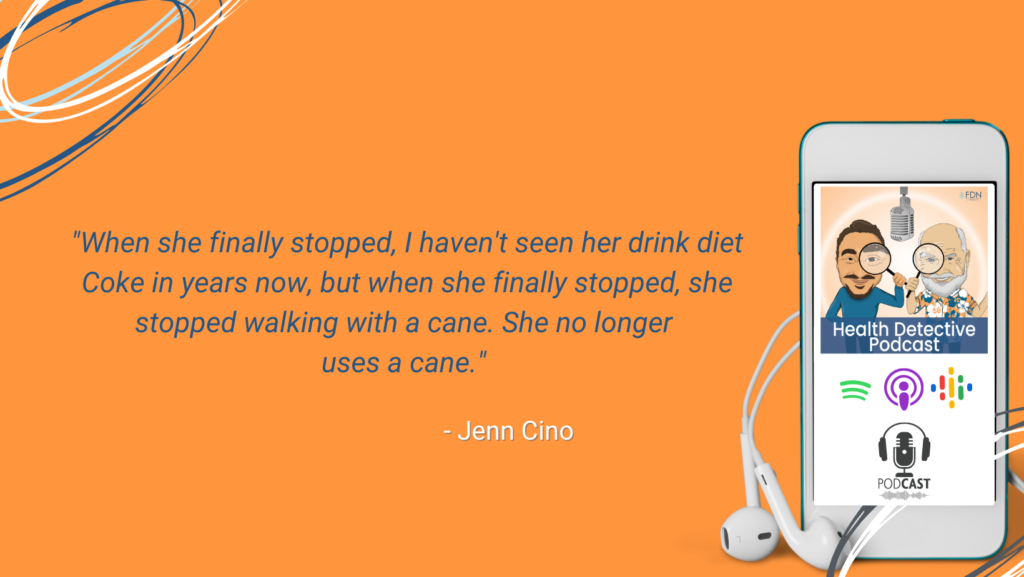
It took me a good, I would say, a good year of really annoying her and almost shaming her every time I saw her with that diet Coke. It was a full-blown addiction for her. When she finally stopped, I haven’t seen her drink diet Coke in years now, but when she finally stopped, she stopped walking with a cane. She no longer uses a cane. She used to take, I remember all through my childhood, we couldn’t leave the house around like 2:00 PM cause she was always having to nap every single day. She had to take a nap, or she couldn’t make it through the day. She stopped napping. I literally don’t remember the last time she napped either.
All these kind of things started improving. I think it took her many, many years to kind of unravel what she knew as a nurse and what she had devoted her life and career to, all this learning and all this money. It took her a few years to come to terms with, maybe we’re onto something here. But that for sure was my very big moment, not so much in terms of supplementation.
History of Autoimmunity: Collecting Evidence
Obviously, I didn’t know anything about gut health or anything like that, but I made that direct correlation. My mom has been diagnosed with this, she drinks this all the time, or she’s eating this type of food and now she’s having these symptoms. Then it was the evidence collected too when a lot of those symptoms actually went away.

I just feel like on your health journey in general, it’s just a bunch of collecting evidence that I’m on the right path, this is working. So, I would say that was probably the biggest turning point for me.
[00:16:38] Detective Ev: That’s so cool. I don’t have a number, Jenn, it’s a lot of people in 170 something episodes, a lot of people have come on and actually said something similar where they watched a documentary, they watched something like that, and it sparked this. Then of course, yeah, that doesn’t solve everything.
But then years later they’re here doing these amazing things, changed the entire course of their life. I kind of find fascinating that something so simple could start that. That’s why I love being able to do this. Maybe this is a little more niche. You wouldn’t find this per se as randomly as you would a Netflix documentary, so fair enough. But you could just stumble on something one day that completely changes your entire life, just because someone happened to share it somewhere, or it came up in your newsfeed. It’s cool when that happens, but it’s also unfair too.
Toxic Additives Get Defended
That’s why we want this information out there to as many people as possible. That’s the blessing of social media, as many curses as it brings, one of the blessings is that we could share information with people that otherwise would’ve never gotten to hear these things. So that’s cool.
I’m glad that you got your mom off that with your aspartame shaming type of philosophy. I’m all for it. You know, I’m not for the shaming normally, but aspartame shaming, I’m on board with that. I’ll do that with you.
What’s so crazy to me is that Western medicine does defend this a lot. You know, they’ll be like, well, there’s no great studies showing the detriments of aspartame or sucralose, although they’re backing off the aspartame one a little bit more now. But the point still remains, and you would think anyone could get behind this.
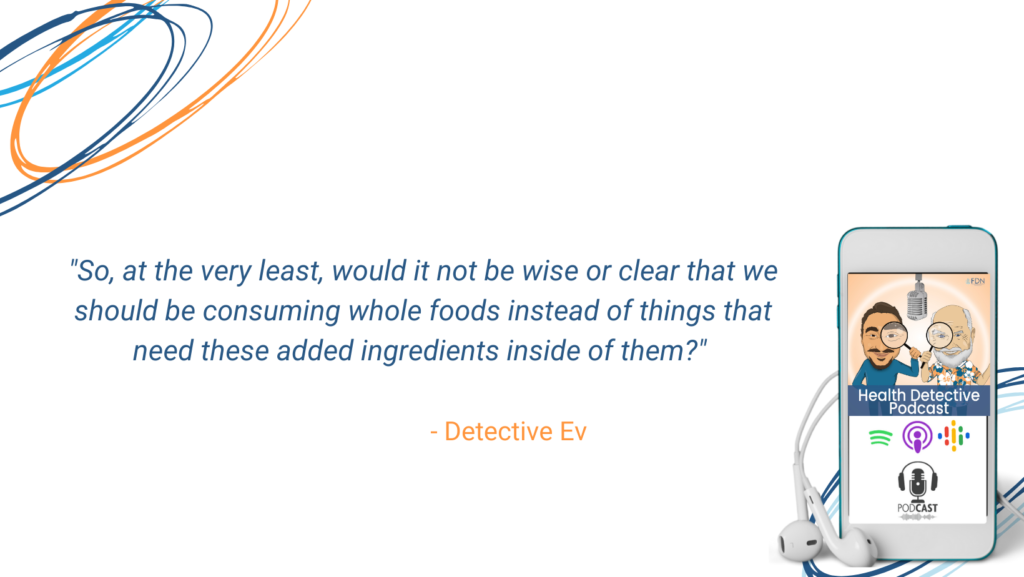
Aspartame is not something that is found in the wild. Sucralose, it’s not something that is found in the wild. So, at the very least, would it not be wise or clear that we should be consuming whole foods instead of things that need these added ingredients inside of them? Like, is that a revolutionary thought or do you have to be Einstein to figure that out? I mean to me that’s just common sense. It is kind of crazy, a little bit, how much it gets defended.
Again, I see this in the fitness space too. I’m not calling anyone out specifically, cause there’s some amazing athletes out there. But there’s probably no other industry that I worry about more right now than the high-level influencers in that space. Because they’ll say, well, the aspartame’s not a big deal, whatever.
History of Autoimmunity: A Lot of Lessons Learned
You and I see them eat seven meals a day. They’re eating all kinds of crap, right? They’re just doing the, if-it-fits-your-macros type of thing. And I mean, thank God that these people haven’t gotten sick yet. I’m very happy for them. But then these are the same people that have the autoimmune diseases and the cancers at 40 years old. People were like, oh my God, they were so into fitness. How did that happen? It’s well, there’s a little more to health than just that.
So, you watched this documentary, you’re aspartame shaming your mom, I love this. What were the first big changes for you though? I want to kind of circle back to that. Did you make any major dietary shifts yourself? I’m assuming you’re not consuming aspartame at that point, but what were some of the big shifts that’s sort of moving things in the right direction?

[00:19:05] Jenn Cino: My journey had a lot of, I guess, what you’d call failures; I call them lessons. A lot of things didn’t work, and it was a lot of trial and error.
I went vegan for a while, thought I felt better. But I was just eating a lot less. I wasn’t eating dense foods and so it helped my digestive system because my body didn’t have to really break down too much density. Over time, things weren’t getting better, things were actually getting worse.
History of Autoimmunity: Full of Fecal Matter
I was losing a lot of weight and so I kind of quit that when I was about 24, 25, and started, I guess, eating back to normally. And in this time, actually, I was more of on the fitness side, having the pre-workout and the protein powders. I wasn’t really making connections at that time that, like you said, all these things are filled with junk, artificial junk.
Drives me crazy as well, seeing Fitness and Flores on Instagram. They’re like, have these greens or have this pre-workout, I’m going to dry scoop it. Then the next post is like, bloating is normal. You’re literally promoting gut irritating foods or products. Then the next one is like trying to normalize the side effects of it.
But you know what? I can’t say it was just one thing I tried. I ended up in the hospital when I was 27 because I had the most severe stomachache. I don’t even want to call it a stomachache cause it was just so far beyond that. The most severe stomachache of my life. They almost took out my appendix.
When they went and did the CAT scan right before I went in for surgery, the doctor came in and he said, oh, your appendix is fine. You’re actually, his exact words were, you’re full of fecal matter. I think when I had that, I had breakfast that day. There was literally no room anymore, cause my digestion was so bad.
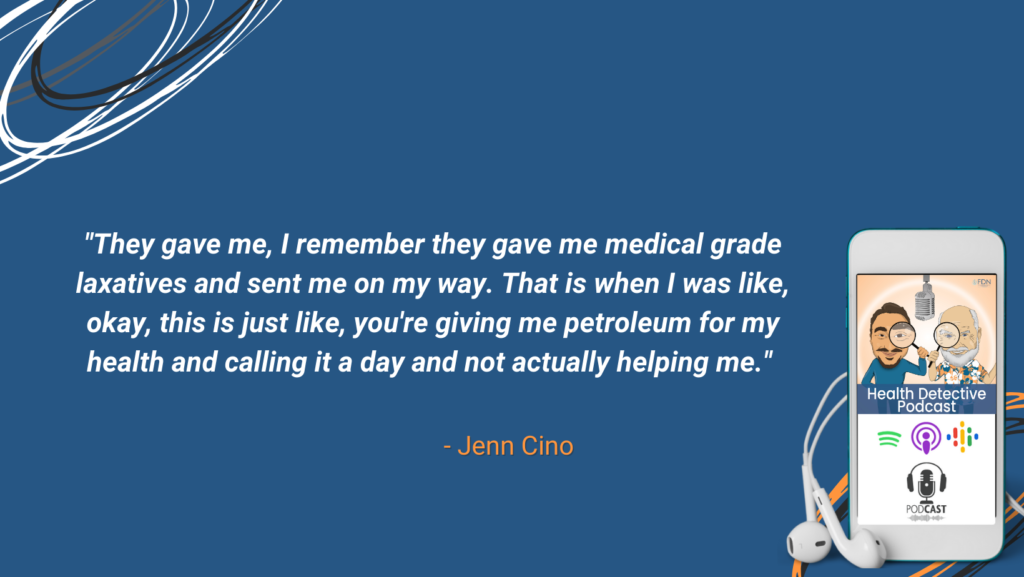
They gave me, I remember they gave me medical grade laxatives and sent me on my way. That is when I was like, okay, this is just like, you’re giving me petroleum for my health and calling it a day and not actually helping me.
History of Autoimmunity: Trying Different Things
From that point, again, that was about four years ago, I think I really started moving towards like strictly whole foods. I mean, I still will have desserts and stuff here and there, but my diet is not based around protein powders and shakes and using shakes as meals and all those things that a lot of people do, especially in the earlier years when they’re just so desperate for help.
I really kind of started taking more of that pro metabolic approach, adding in a lot more red meat and high-quality foods, more than anything. I don’t think my diet necessarily radically changed. It was just the quality of food changed. I switched to organic when I could. I eat grass fed meat now instead of that, conventional, what you get from Costco for a really good price. It kind of just evolved.

Again, I can’t really say it was one thing or another, because I tried so many things that didn’t work. But then I tried things that did work and again, it was just kind of collecting that evidence over time. Doing a lot of things that don’t really revolve around food, or even supplements. Things like castor oil packs really started helping me. I started doing cold showers and cold therapy. I think that actually got rid or helped me get rid of my Raynaud’s cause I also had Raynaud’s.
[00:22:21] Detective Ev: Ironically, right? Yeah. It’s like counterintuitive.
History of Autoimmunity: Lifestyle Practices
[00:22:24] Jenn Cino: Yeah. It’s like that blood vessel workout.
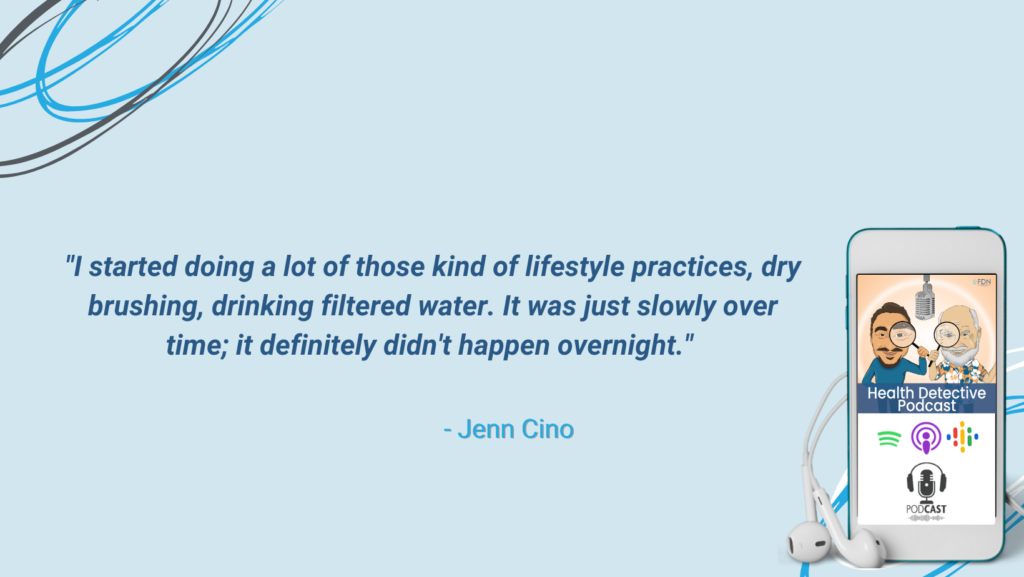
I started doing a lot of those kind of lifestyle practices, dry brushing, drinking filtered water. It was just slowly over time; it definitely didn’t happen overnight. It took me again like 10 years probably of trial and erroring things and learning things along the way and slowly switching out products and activities. It all accumulated. It’s never just one thing. There’s always a little bit of things that add up to the big things over time.
[00:22:52] Detective Ev: I know we have all types of listeners on here. If someone’s not familiar, Raynaud’ s is characterized by these people usually having an extreme sensitivity to cold and stuff. The first time I had seen it was, long story short, was like a bunch of friends and myself hosting a retreat. This girl came that I didn’t know. We were in the Adirondack Mountains in New York, in winter, January.
This poor girl has that condition. We’re out there going on an ice climbing thing, like a guided ice climbing thing. And she is in so much pain, like, crying level. We had to stop the trip and go back type of thing. I was like, I don’t know if you’re either crazy or beyond tough that you would even sign up for a trip like this, knowing that you have this condition.
But that’s why I was saying for those listening that maybe didn’t get that, that it’s counterintuitive. Cause you would think, well, you put someone in cold therapy with that, that’s the worst thing they could do. But I’ve always wondered about that cause I can’t recommend that of course.
History of Autoimmunity: Contrast Therapy Helped Heal Raynaud’s
It’s interesting to me that you did it and found that it helped. Was it very hard to do that in the beginning? Was there a lot of pain?
[00:23:49] Jenn Cino: Yeah, I used to be that girl too. I mean, I live in Canada. The winters here are freezing. I would step outside and in 30 seconds my toes were gray, my hands were gray. I would walk around in my house with heating on. I have pictures of my mid-twenties, taking pictures and sending them to my mom of my toes. My second toe would be completely white and the rest of them were red or like normal skin color. I used to be in so much pain.
You know what, it was more contrast therapy that I would do. So, I would do like 30 seconds cold, 30 seconds warm, and just go back and forth so that the blood vessels are contracting and relaxing and contracting. It’s, again, kind of that workout.
I don’t remember being in pain more than I was in pain mentally, because I think it’s more of a mental exercise more than anything. Yeah, the cold is awful, especially if you have Raynaud’s and you’re always cold. But I think I enjoyed the mental challenge of it more than anything.
I feel like it was really an exercise of mental toughness, which is why I originally started it. I didn’t start it for Raynaud’s, I started it more for anxiety. Over time I was realizing, actually, this isn’t really affecting me as much as it used to, and now I don’t get it at all anymore.

I’m never cold anymore. I don’t talk about that a lot, but that was definitely a big health win for me.
Look At the Bigger Picture to Health
[00:25:06] Detective Ev: Well, yeah, I’m glad that we got to talk about it because it’s one that I don’t typically have much advice for. The people that come to me with that, it’s usually one of their only symptoms, believe it or not.
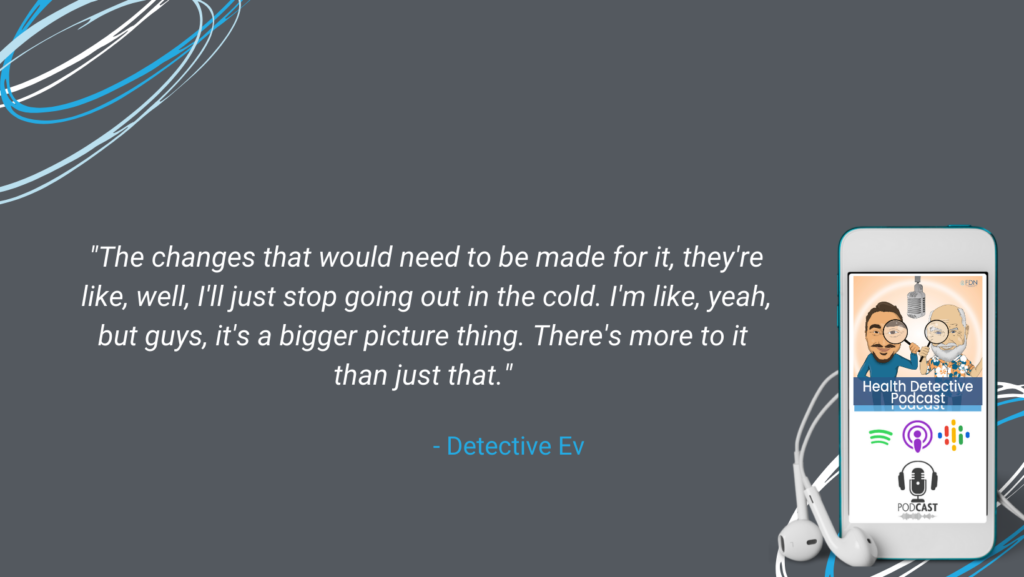
The changes that would need to be made for it, they’re like, well, I’ll just stop going out in the cold. I’m like, yeah, but guys, it’s a bigger picture thing. There’s more to it than just that. So, it’s really interesting to hear the cold thing cause I had always been kind of fascinated by that. I’m like, wouldn’t this actually help someone if they were willing to do it long term.
I think the way that you described it with the contrast therapy that’s a smarter way to do this. I just coincidentally did that for real for the first time, just last weekend. There’s a place like an hour away from me, cause I want to get it in a facility that my buddy and I own here, they have a cold plunge in the same room as an infrared sauna. It’s like a float studio, but they just happen to have this room with that.
I’m like, I’ll drive the hour for it. Screw it, I want to go try it out. It is fun because normally I would sit in a cold plunge for like five to 10 minutes. What’s weird is if you do it for that long, actually the numbness grows and you lose the pain. So, you’re just like, okay, like whatever.
History of Autoimmunity: Cycle of Trial and Error
What I found is every single time I went in, it was actually a lot tougher because my hands would start hurting again within 30 seconds, every single time because it was cold, it was in the forties. But what’s nice is, yeah, you move into the sauna, and you’re good within a matter of 30 seconds. I feel like it’s a much safer way to approach something like that than it would be otherwise for someone to just jump in there for 10 minutes with that condition. So, that’s great. All right.
So, you’re trying the diet stuff. You even described that you were in this cycle of trial and error, which is something we talk about all the time on the show, Reed Davis talks about it.

It could be just Western medicine. You could be in the cycle of trial and error, just trying different pills, medications, even a surgery, perhaps. But you can also have the cycle of trial and error in the world of natural health. We go to the supplement store, and we try anything that the representative there recommends. Or we’re buying stuff off Amazon, or we’re trying this diet or the next diet.
To become an FDN and to have graduated, obviously now you’re taking the health to a much deeper level. I mean, that’s a whole different thing. So how did we go from the Jenn who is willing to experiment with the diet a little bit, to Jenn, who’s now a successful FDN? I believe that you have other certifications or qualifications, at least, as well. When did you start accumulating those and why?
Transitioning Business to Online
[00:27:08] Jenn Cino: So, I actually used to own a gym in Ontario. With COVID coming around, that got shut down pretty quickly.
I had opened it July 2019. Obviously, it was shut down March 2020. Honestly, blessing in disguise for sure. Because we were, I mean, even in those eight, nine months we were running ourselves into the ground, probably making my health a lot worse. It was just solely, again, focused on that fitness aspect of things.
Yeah, March 2020 rolled around, my partner, he ran the gym with me. All of a sudden, we both didn’t have jobs. I don’t know how much you guys have heard of Canada, but the lockdowns seem to be like a decade long.
[00:27:43] Detective Ev: Even more extreme than the U.S. if you guys can believe it.
[00:27:46] Jenn Cino: Way more extreme.
Luckily, we had only signed a lease for a year. Our lease was up July 2020. Seriously. Thank you, universe. We both had obviously no income, but I had switched basically to online. Of course, it was, you know, two weeks to flatten the curve. So, I’m like, okay, I can teach these things on zoom for two weeks. I kind of rallied the troops and we were doing that.
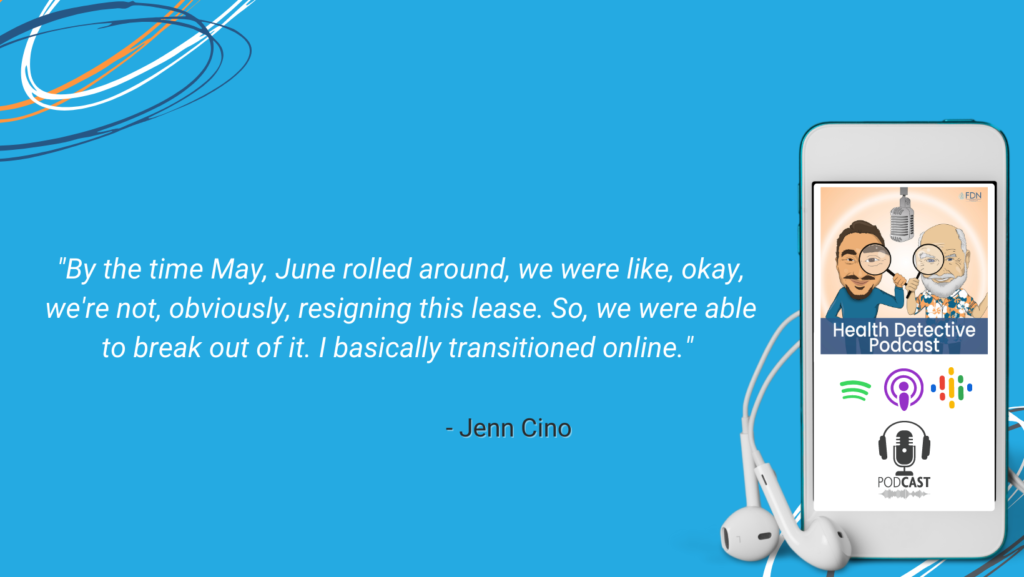
Then obviously, it wasn’t two weeks. By the time May, June rolled around, we were like, okay, we’re not, obviously, resigning this lease. So, we were able to break out of it. I basically transitioned online. I had kind of gone online in December of 2019, a few months prior. I was kind of dabbling in the online space, and I was doing kind of just like a 12-week fitness program.
Working with Women on Their Hormones
Ironically, I had this client, she was in her fifties, she was on HRT. I was very much, again, not educated. I didn’t have any certifications beyond my basic nutrition and personal training.
We were doing the macros, the exercising, the lifting, and her weight just would not budge. I remember thinking, okay, she’s on estrogen therapy, maybe there’s something else going on here. I’m grateful that I was able to not just stick to the “calories in, calories out” thing that is like pushed down your throat in PT school.
I started researching more into hormones. That kind of sparked interest more in the hormone side. Then I stumbled upon research on birth control and more light bulbs started going off of my own journey.

So, that summer, after I had shut down the gym, I had taken an advanced, basically holistic hormone certification, through ITN. I pivoted from my fitness program that was just a little baby at that time cause I was running my gym. I pivoted more toward period health and menstrual health and hormone health, that kind of stuff. That is where my original program was born. I worked with women on their hormones for, I guess, a year and a half.
Pivoting from Just Hormone Health Using FDN & Functional Lab Testing
I ran that program and then I came to FDN. One of my friends, Nicole Ritter, she’s an FDN, she was like, yeah, you should totally do this. I remember talking to her while she was doing her certification and it never really piqued my interest to be honest.
It’s crazy to say out loud, but I didn’t see the value in lab testing. I think cause I had been let down with, oh, your labs are normal, for the last 10 years of my life. Everything is fine. So, I was like, why would I do that? Then I started seeing other people in this space who were FDNs, and I was like, okay, maybe there’s something here.
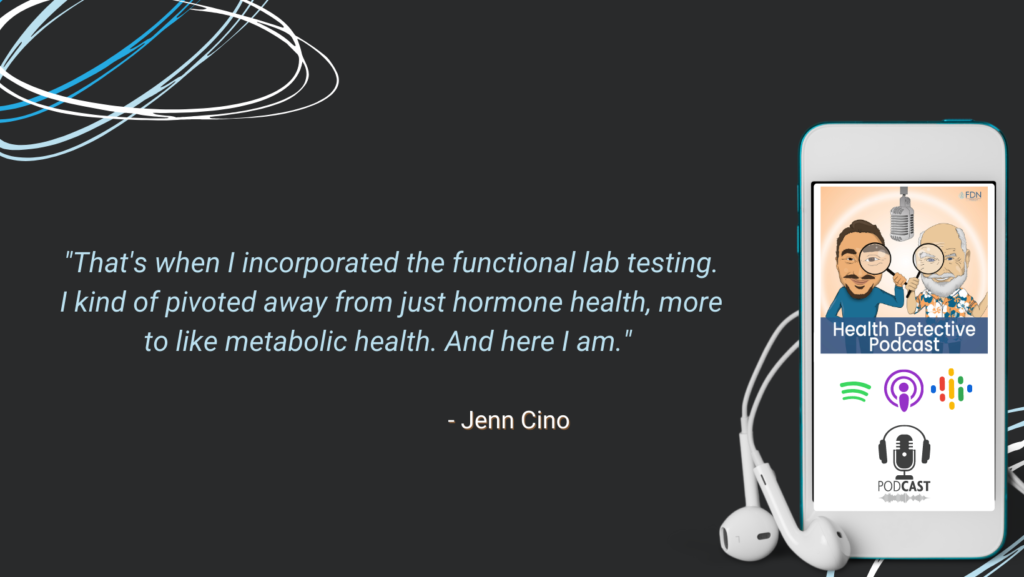
That is actually when I joined FDN. I went through it super, super quick cause I was just obsessed. I became obsessed with all the information that you guys teach. I only finished FDN in March, so it’s only been a couple months, which is pretty crazy. That’s when I incorporated the functional lab testing. I kind of pivoted away from just hormone health, more to like metabolic health. And here I am.
Commercial Break – Try the FDN Course for Free
[00:30:39] Detective Ev: Hey there folks. It is Detective Ev popping in here really quick. I got two things for you. One is stay tuned for the next episode cause I should have a link for you guys, I believe. Reed and myself, Reed Davis is the founder of FDN if you don’t know, we will be down at the biohacking Congress in Miami.
It is a long weekend. It is October 22nd and 23rd, Saturday and Sunday. They’re long days. It’s like 8:00 AM to 6:00 PM, but we will be there. Reed will be speaking. I’m sure he’ll be on a panel or two as well. I’ll be hanging out at the booth, talking to you guys and just chatting about FDN and health. So come check us out. That’ll be in Miami, Florida. I will give more details on that pretty soon.
Outside of that, I wanted to say, if you are listening to this episode and thinking about maybe becoming an FDN, because clearly it had benefit in my life, that’s why I’m here. And Jenn, it had tremendous benefit in hers as is obvious by the explosion of her business.

Well, you can actually try the course now completely for free. You go to fdntraining.com/tryfdn and you can try the course, no credit card required.
My girlfriend, Maddy, actually just signed up for the course herself. One of the first things she did was try the course just to make sure it was right for her. Then, here we are. She’ll be on the podcast one day.
So that’s fdntraining.com/tryfdn to try the course completely for free.
All right. Now, back to today’s episode.
Summary of Gym Business Adventure
I love this story. Yeah, you don’t mess around. This story that you just told, even in this last answer, sounds like a 10-year thing. And it’s like, oh my God, we’re talking about like two and a half years, basically. Not even really, and you’re getting all this done with the gym and all this stuff. That’s impressive. And thank God, a one-year lease on a business, that’s insane.
[00:32:11] Jenn Cino: Well, we had the prior owner of that gym. So, my partner worked there as a trainer, and he was about to shut it down cause it was just a money pit. He had other business ventures that he was focusing on. Chris got word that he was planning on shutting it down, which would mean Chris would be out of a job. He kind of approached the owner and said would you be open to us just taking over? It was a five-year lease, but there was only a year left of that lease.
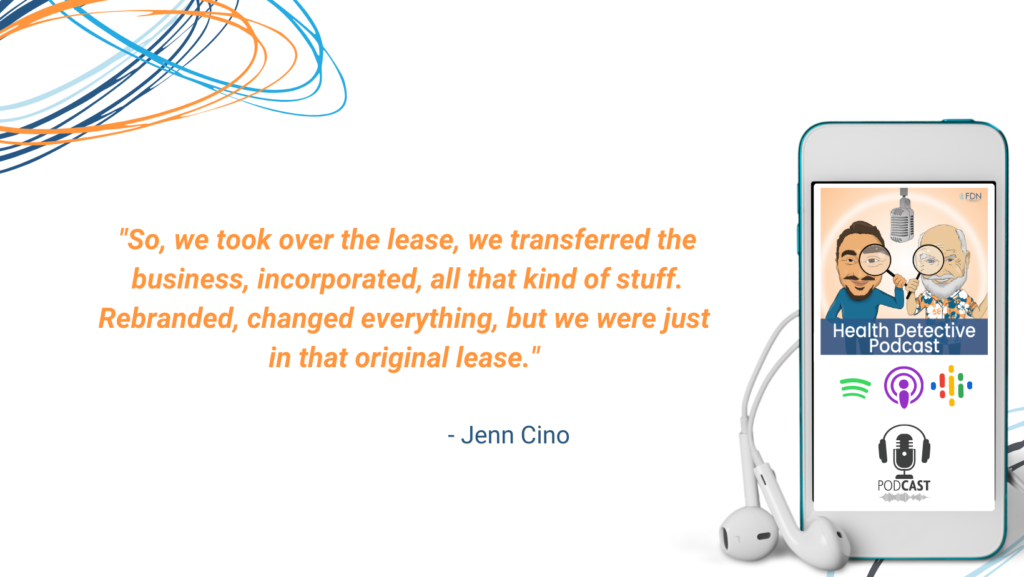
So, we took over the lease, we transferred the business, incorporated, all that kind of stuff. Rebranded, changed everything, but we were just in that original lease.
[00:32:46] Detective Ev: Okay. I was like, I don’t know how they do it in Canada, but I’m not getting a year lease for a business down here very easily. That’d be pretty insane.
So, when you finally did see the value in FDN and the lab testing and stuff, and to your point, that’s totally fair. Because if the only experience you have with lab testing is being let down countless times that’s fair enough.
FDN was the Game Changer for Business and for Clients
We are using the technology in a unique way, right? We’re interpreting it a unique way. You obviously liked it; you said you flew right through it. What were some of the things that most excited you about it? What did you like most about the FDN course?
[00:33:15] Jenn Cino: Honestly everything. I loved everything about it and I’m not even just saying that cause we’re on this FDN podcast right now.
But you know, I loved the hormone stuff. Obviously, I had a vested interest in hormones to begin with. I was super interested in being able to test women’s hormones and not just guess off of symptoms, which obviously has helped a lot.
I mean the gut stuff was super valuable for me alone because although my health journey kind of started with birth control, it was the digestive issues that really negatively impacted my life for so many years. I was just super drawn into all these things about gut health, because again, no doctors ever told me any of this. I didn’t know that it was any potential root causes it starting in the gut.

Then all the other things are just kind of like fun bonuses, like learning about the liver, bile acids, toxins, and things like that. Honestly, there was so much value in it, I think it was such a good foundational course, in terms of lab testing. Since then, I’ve done like HTMA and some other certifications that way. It was just the missing piece of the puzzle, not only for me and my business, cause my business completely blew up after I was able to offer these labs, but it was a game changer, obviously, for my clients too.
Functional Lab Data is a Clear Path to Rebalancing
It’s very validating for a client too, first of all, not be told it’s all in your head or your labs are normal. I tell people all the time, I’ve never seen a normal lab ever. Well, we’ve had hundreds of women come through our program in the last, I don’t know, five, six months, and I’ve never had a normal lab. Have I had cleaner labs than others? Yes. But there’s always something we can find.
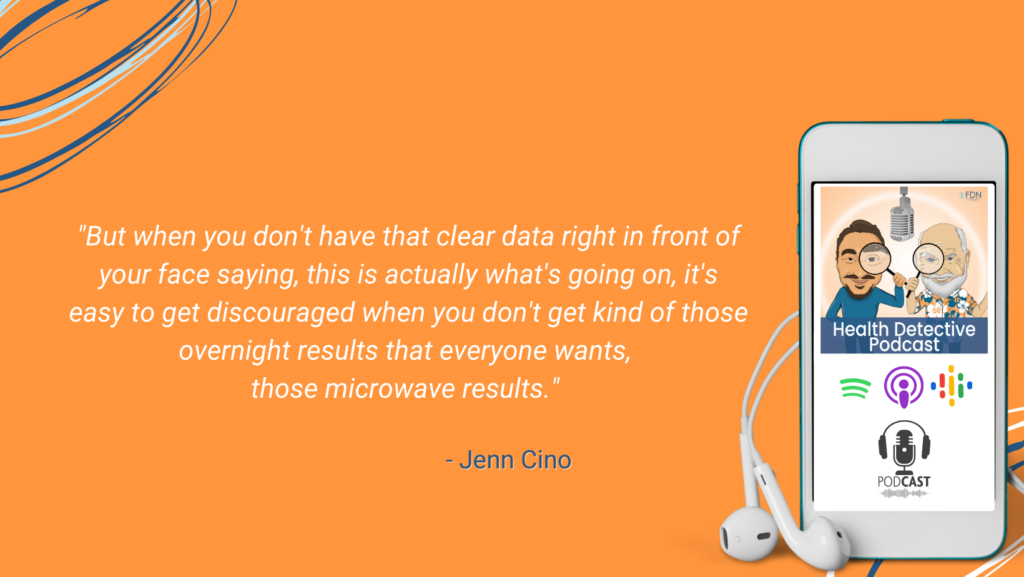
If you’re coming to me with symptoms, your labs are not normal, I’ll tell you that. So, it, again, not only great for my business, but really, really validating for the women I work with to finally have answers. I think it helps the client stay the course as well. I could teach them the lifestyle stuff and the diet, and I still do that, it’s still part of my program. But when you don’t have that clear data right in front of your face saying, this is actually what’s going on, it’s easy to get discouraged when you don’t get kind of those overnight results that everyone wants, those microwave results.
So again, if you’re, you know, hey parasites have come up, or your pancreas isn’t secreting digestive enzymes and that’s why you’re having so much trouble digesting your food, or your estrogen is through the roof, I think it gives that client a lot more trust in the process and a lot clearer pathway of how to actually go to rebalance as well.
Functional Lab Data is Validation
[00:35:43] Detective Ev: Especially with that last point, my acupuncturist, we always have these. He’s a very respectful guy, but we always have these healthy debates. We’re not afraid to challenge each other with anything. So, I’m telling him about the labs a couple of years ago that I utilize.
He said, well, Ev. And this is an older guy. I think he’s been doing this for a while, he gets great results. He said, don’t you think those labs can kind of hurt people? And I said, what do you mean? He said, what if something comes back on their labs that’s not so great and now it’s in their head that they have that.

What I said to him is, I said, I am so glad that you have never been sick enough that that would be your experience with the labs. Because our clients and the people that go through the FDN course, it is the exact opposite. It is a validation. Like you said, the reason that they’re sticking the course is because they probably, one, feel validated like, wow, there actually is something here when everyone else has told me that there’s not.
I think to his point, if I ran labs on all 330 million people in America, including the few that are not symptomatic, and then told them something that was wrong with them, well, yes, that might get into their head, especially if they thought that they were fine before that.
Functional Lab Data + FDN Principles Give Hope
But when we’re talking about someone that for five, 10, sometimes 20 or 30 years, depending on who’s coming through the course, has dealt with chronic symptoms and has been seeking answers and can’t find it. No. Finding the stuff on the labs is one of the best things that could ever happen to you. I was 21 when I went through the course, and I was in the exhaustive phase of HPA axis dysfunction.
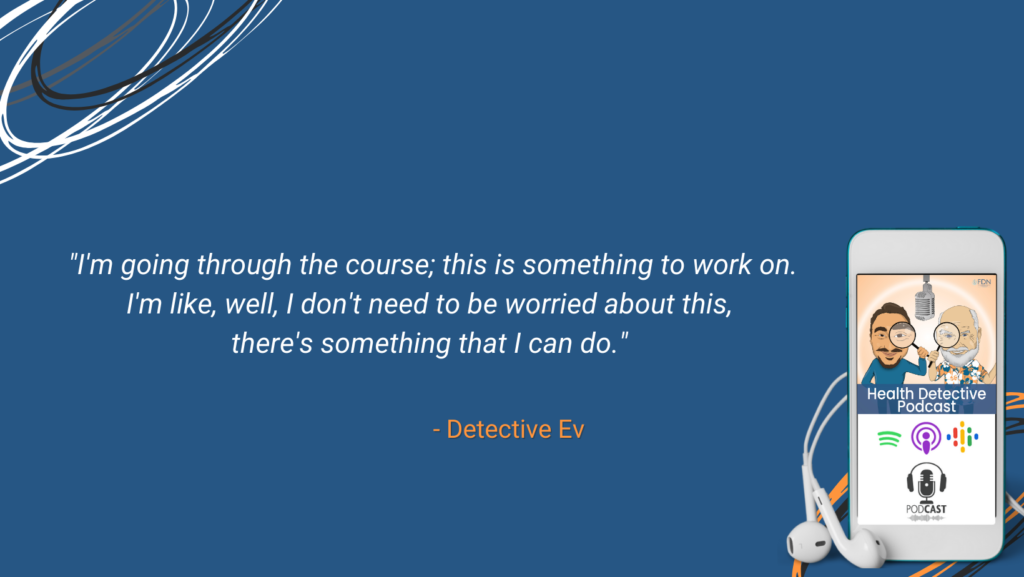
No, I wasn’t thrilled about that. That’s not something you call your mom and brag about, right? At the same time, after that initial hit, which only lasted 30 minutes, I said, well, wait a second. I’m going through the course; this is something to work on. I’m like, well, I don’t need to be worried about this, there’s something that I can do. Of course, I was able to get out of that.
Where are you at symptom wise now? Especially after going through FDN? Because if you went through it that fast and you graduated in March, I’m assuming you would’ve joined at the time that they were giving out multiple lab tests with the tuition.
[00:37:24] Jenn Cino: Yeah. I joined black Friday in November, so basically, I started December. I think I went through it, through practicals, exams, in about three and a half months.
[00:37:33] Detective Ev: Wait, Nicole Ritter. Did we talk before on the phone?
[00:37:36] Jenn Cino: Oh, maybe. I don’t remember.
[00:37:38] Detective Ev: Was I your salesperson?
Jenn Cino: I think you might have been.
Detective Ev: Okay. I’m like, wait a second. That’s funny. Anyway, the audience is like, we don’t care. Just tell us something else about health. That’s very interesting though.
Learning to Gently Give Clients the Evidence & the Validation
But yeah, so how did this help your own health? Like what did you find on the labs? I guess, I’m trying to get into the nitty gritty. Like, did you find something that was maybe like, whoa, I’ve never seen this before or wasn’t expecting this?
[00:38:01] Jenn Cino: I mean, I found actually quite a few things. When you said your shock lasted 30 minutes, I’d say mine lasted about three days and then I got over it. I see this happen with clients too, just going back to that point, was it your acupuncturist, you said?
Detective Ev: Yeah.

Jenn Cino: So, to that point too, I think the delivery is everything. This is something that comes with time as a practitioner, kind of softening the news. Like, you don’t have to say, oh, your digestion is unhealable basically. You obviously don’t say that to a client, right? It’s also a skill of how to gently break the news but also give them the hope, the evidence and the validation. Some people get really overwhelmed.
I still have clients that are like, oh my goodness, am I dying? I’m like, no. They freak out and I have to kind of bring them back. Like, you wouldn’t be in this program if you felt amazing. You know what I mean? It’s not a shock that things have come back imbalanced. I understand it feels intimidating, but that’s why I’m here. That’s why you’re in this program.
For me, my anti-gliadin was through the roof. So, I’m off gluten, which obviously has, I’m assuming, helped, fingers crossed, my Hashimoto’s and my thyroid. I had really low bacteria in my gut as well. Probably from lots of antibiotics.
Rebalancing and Being a Personal Guinea Pig
I was that kid that when my brothers were on antibiotics, you know, the banana, I think, amoxicillin tastes like banana. I don’t know if it does in the U.S.
[00:39:21] Detective Ev: It’s kinda like a pinkish bubble gum thing.
[00:39:22] Jenn Cino: I used to dip my finger in it and eat my brother’s antibiotics, which makes me cringe. I’m like, oh, I wonder why I had gut issues for so long.
But yeah, I had hormone imbalances and I had really high bile acids. But again, it was, okay, now I understand why my thyroid’s probably not converting very well. Or why my gut has been such a mess for so long.
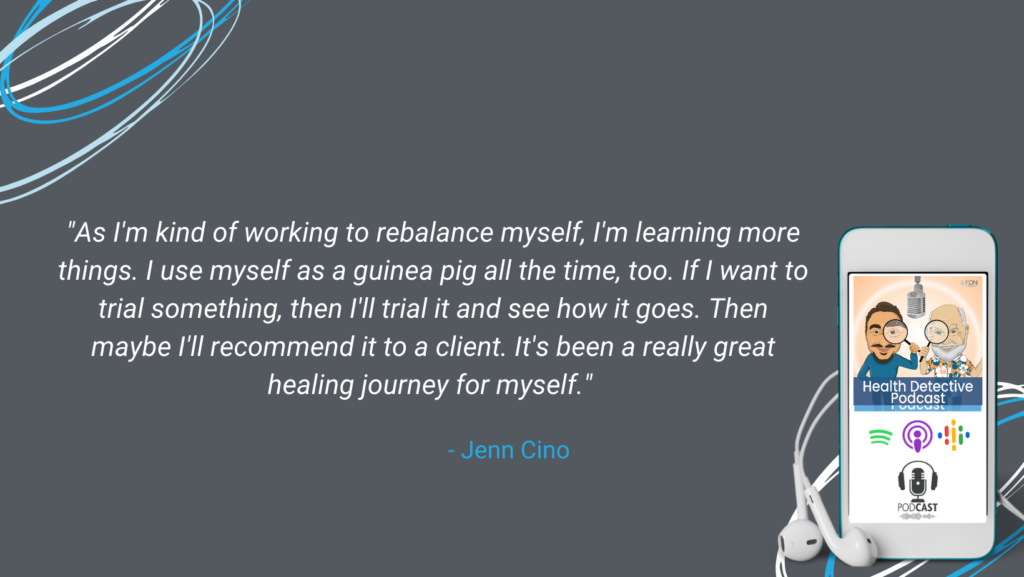
It’s been a journey for myself too. As I’m kind of working to rebalance myself, I’m learning more things. I use myself as a guinea pig all the time, too. If I want to trial something, then I’ll trial it and see how it goes. Then maybe I’ll recommend it to a client. It’s been a really great healing journey for myself. But also, being able to take my own experiences and pass that knowledge on and expedite the process for a lot of our clients is why they come to us.
[00:40:12] Detective Ev: Well, that’s crazy. It might honestly be a bigger push in the functional space in the U.S. now, but like the gluten thing is so standard, that I almost just assumed that you were off of it already. So, to go through the course and then see the high anti-gliadin, that’s actually a really good thing. That’s such an easy healing opportunity.
I’m excited for you. I hope your labs come back great because I’ve seen that change alone be the difference.
Jenn’s Ideal Client
I’m not making a claim, this is just what I’ve seen guys. For some people, it has been the difference between them having a diagnosis of Hashimoto’s and eating like Synthroid or something, and not. I have seen that make-or-break difference just from the gluten thing. They don’t even do the other lifestyle stuff. So, you get someone like you who then adds that on. I’m excited. I think that’s going to be great for you.
I wanted to spend the last like eight minutes or so, just talking about what you’re doing now and how you help people. Of course, you mentioned you have these programs. So, who is kind of your target client though? I don’t mean just like, from a marketing perspective. I mean, in the sense of, if I’m listening and I’m like, wow, I like Jenn. I think I actually would be interested in working with her. I think it’s also important for you to have an opportunity to say who your ideal client is. What does that person look like?

[00:41:10] Jenn Cino: I mainly work with women. I would say, probably between 25 and 35. I have older, I have younger.
It’s actually kind of crazy too, because when I was 20, 21, I probably wouldn’t have invested a couple thousand dollars in my healing at that point. It’s really remarkable when I have these really young women coming in, having that awareness that something needs to change before it gets further and further.
Ideal Clients Are a Lot Like Us
I do have a handful of clients and it’s actually quite sad too. Because I’m like, wow, women, in my case, are getting worse and worse, younger and younger, which is quite shocking some of the things that come back for such young women. But again, it’s all good things in the end.
So, I would say between 25 and 35, 40. The majority of the gals are, you know, a lot of period problems, a lot of digestive issues. Things like acne and stuff come up. I’ve seen a lot of hair loss lately. That’s a big one, low energy. We have women with all different types of symptoms.
Again, I just try and educate them that the root causes are pretty much always the same. When we really nail into it, it’s just presenting differently in different women. Some women might have acne and others might have bloating. We just have to find that centerpiece where we can look for those healing opportunities, like you said. So that’s kind of my ideal, I guess, target market or target client or that’s who’s attracted to me, I guess. And probably, a lot of women who deal with thyroid issues.
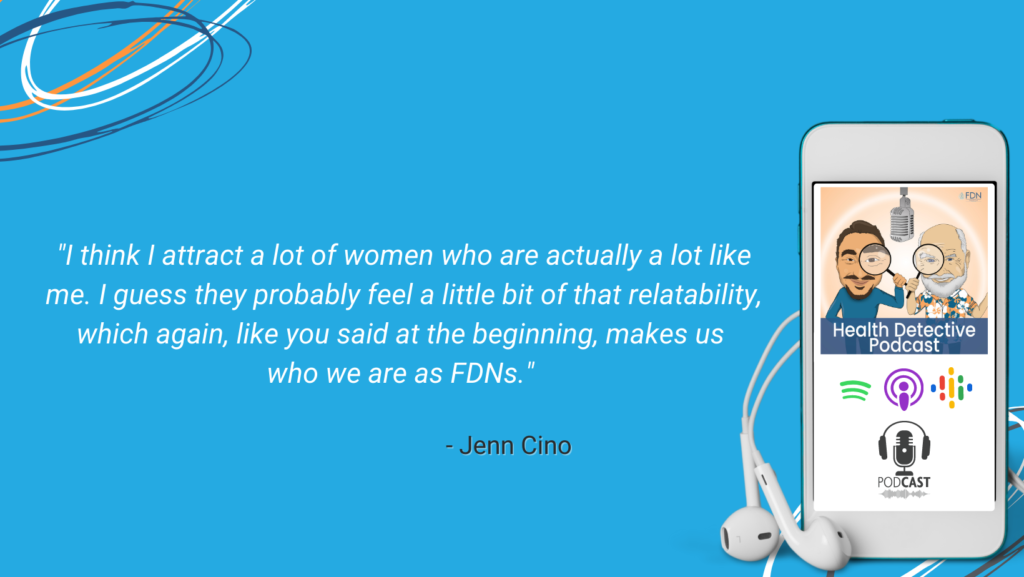
But on my social media, I’m very open. I don’t really put much of a sales hat on. I kind of use it as like my platform for not only documenting my journey and my lifestyle, I guess, but also celebrating other women and you know, all those types of things. I think I attract a lot of women who are actually a lot like me. I guess they probably feel a little bit of that relatability, which again, like you said at the beginning, makes us who we are as FDNs.
Our Clients Are Going Through What We’ve Learned to Beat

Most of us aren’t coming into this because we’re like spick and span, healthiest person on the planet. Most of us are coming in cause either a family member or a close friend or ourselves have gone through the things that our clients are going through right now. So, yeah. That’s kind of wrapped up who’s in my program.
[00:43:25] Detective Ev: On a side note, it’s an interesting observation that you say you’re seeing them get sicker and sicker, younger and younger. It seems like what you described in the beginning, you and I are kind of similar in a tendency to think into the future. Like you said, I’m 20 something now, what’s going to happen at 30, 40, 50, which you would think would not be that profound of a thought.
But I don’t think that’s the way most people’s brains are wired because it actually doesn’t really make sense from an evolutionary perspective to be thinking 30 years down the road. You need to think about what protects you right now. There’s no currency. There’s no U.S. dollar or Canadian dollar, like, you don’t have to think about savings 30 years later, you have to think about your resources in the immediate moment.
My point is, that’s what scared me at 18, Jenn. I was sick since five years old. But I got my worst diagnosis at 18, with which I was told was incurable. I’m like, yeah, that’s probably not true so I’m going to go try other things.
I was sitting on the pity potty for a while. I’m like, woe is me. Why can’t I go have fun with my friends? I want to stay out late. I want to go to college and parties and stuff. I really couldn’t do that.
Where to Find Jenn Cino
Here’s the thing though, I started realizing as I’m researching more and more, I said, oh, no, this isn’t just me. I’m just one of maybe the slightly more unlucky ones that got sick first. This is going to happen to all of them. And sure enough, you fast forward nine years later, about to turn 27, the main people that I have calling me are all my friends who went to college, who now have autoimmune diagnoses, or they gained 50 pounds out of nowhere, severe skin issues. Mental health is just trashed, and they don’t know why.
It’s a sad thing to be right about prediction wise. I’m not trying to be pessimistic to the audiences here. What I’m trying to share is there’s plenty of people to help out there. We need more and more people out there sharing these messages on social or on podcasts or whatever it is, letting people know that there’s alternative means.
So, you mentioned your social media, where can people find you if they want to follow you or consider working with you?

[00:45:08] Jenn Cino: Yeah, I’m mainly on Instagram. My Instagram is lifeasjenn, Jenn with two Ns. Then in my bio you can find my Facebook group. My Facebook group has, I don’t know, two and a half thousand, maybe, women in there.
I’m not super active. I’ll do like free workshops and stuff every now and again, free challenges. But it’s really great, cause a lot of the women can post anonymously and stuff like that.
For Jenn’s website, go to fit-period.com.
A Nice Safe Space to Share
A lot of the women will post about their own experiences or asking for advice or asking for similar experiences that other women have gone through.
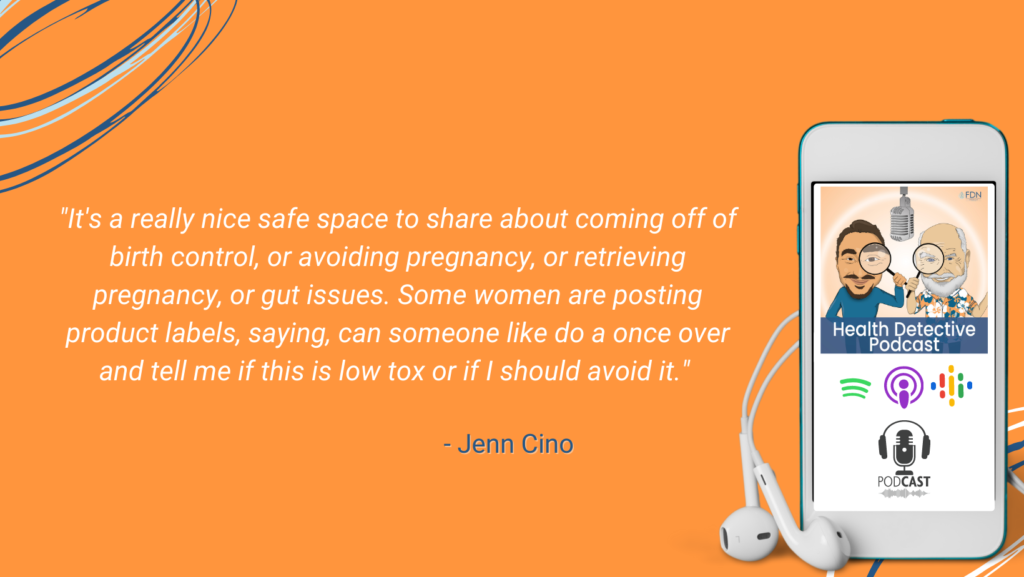
It’s a really nice safe space to share about coming off of birth control, or avoiding pregnancy, or retrieving pregnancy, or gut issues. Some women are posting product labels, saying, can someone like do a once over and tell me if this is low tox or if I should avoid it.
Those are my two main channels that I congregate in. One’s a little bit more community based. Then, of course, on Instagram is where I do a lot of education. I tell people all the time, you could change their life with my Instagram because it is all straight up knowledge. I do a selfie now and then; I get like a quarter of the likes. I’m like, okay, no one cares about me, they just want to learn. So yeah, definitely if you’re interested in learning all about women’s health, that’s the place to find me.
[00:46:20] Detective Ev: That gives me hope for humanity, because normally, especially for a woman, let’s be honest, it’s the exact opposite. Try to post something useful, that gets nothing. Then they post themselves and everything. Right? So, you have the right people following you if it’s the opposite. I think this gives me hope. So that’s great.
We’ll put all this in the links for everyone to find out.
Health Detective Podcast Signature Question
Jenn, I want to end with our signature question on the Health Detective Podcast. Nothing crazy here, but it’s just cool to hear the different perspectives. The final question for today is, if I could give Jenn, in this case, a magic wand and you could wave it and get every single person in this world to do one thing for their health, whether that’s literally go do one thing or maybe stop doing one thing, what is the one thing that you would get them to do?

[00:47:00] Jenn Cino: Oh, there’s so many. I would say, get 10 minutes of sunlight every single morning. It’ll change your day and then it’ll change your life.
[00:47:12] Detective Ev: All right, guys, that’ll do it for today’s episode with Jenn Cino. I hope you guys like this one. I’m so looking forward to having her back on eventually, because I don’t know about you, but it was such a cliff hanger to me not knowing whether or not her lab tests are going to come back favorable when she gets this thyroid test back.
I totally think it will. It was just interesting to me that she hadn’t even removed gluten yet. It just goes to show, this space, we end up in a bubble because sometimes we think everyone’s like doing all the stuff that we know as FDNs. The truth of the matter is that’s just not the reality. There are plenty of people that have so many areas that they can improve upon. That’s actually a great thing.
Conclusion
It can be overwhelming if you think about it from a societal perspective. It’s like, holy crap, so many people are sick. There’s so many things to do. But then there’s the other side of that coin where it’s like, well, we have a lot of answers for people. We have a lot of things for them to try that they’ve never even considered. We probably have the tools necessary for them to radically change their health, or perhaps even heal themselves at the best-case scenario, which is what so many people who have come on this podcast have been able to do.
I’m looking forward to a subsequent episode with Jenn down the line. And I will remember to ask her that question when we do that episode, for sure. So, any of the long-term listeners will probably appreciate that.
But anyway, that is all for today. I’m looking forward to talking to you guys again soon. Until then though, take care. Thanks.
You can always visit us at functionaldiagnosticnutrition.com.
To hire a coach, go to fdnthrive.com.
For a free Health Review, go to fdnthrive.com/match/.






More Stories
Mushroom Gummies: Do They Actually Deliver?
A dermatologist’s pre-wedding skincare timeline for looking your best
Three incumbents, two challengers running for Havre de Grace City Council; Mayor Martin will be unopposed in May 4 election